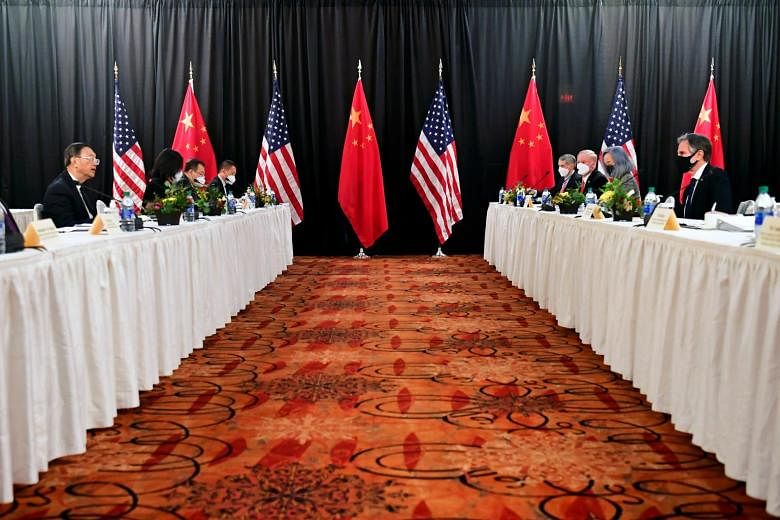WASHINGTON - The opening of the first meeting between senior United States and Chinese officials since President Joe Biden took office was on Thursday (March 18) marred by a biting back-and-forth between the two superpowers, with envoys of both sides trading barbed criticisms of the other's governance and faults.
But after the opening rancour, played out in front of international and Chinese media, the US and China got down to business and had meaningful discussions behind closed doors.
A pool report quoted a senior Biden administration official as saying that the ensuing conversation was "substantive, serious, and direct", running well over the two hours initially allotted.
The US used the session to outline its interests and priorities, and heard the same from its Chinese counterparts, said the official.
The rocky start to the two-day talks in Anchorage, Alaska, began with US Secretary of State Antony Blinken telling his Chinese counterparts that the US would bring up its "deep concerns" about China's policies in Xinjiang, Hong Kong and Taiwan.
Mr Blinken also listed Chinese cyber attacks on the US and economic coercion of allies as actions that "threaten the rules-based order that maintains global stability".
"The alternative to a rules-based order is a world in which might makes right and winner takes all and that would be a far more violent and unstable world for all of us," he added.
Also representing the US was National Security Adviser Jake Sullivan, who said: "We do not seek conflict, but we welcome stiff competition, and we will always stand up for our principles, for our people, and for our friends."
China, represented by top diplomat Yang Jiechi and Foreign Minister Wang Yi, fired back in a long reply, with Mr Yang saying that the US and China each had its own style of democracy and that Beijing firmly opposed Washington's interference in its internal affairs.
Chinese state broadcaster CCTV said Mr Yang emphasised that the US was not qualified to speak condescendingly with China, and that dealing with China must be on the basis of mutual respect.
"History will prove that it is oneself who suffers in the end if a hard-headed strategy is used with China," Mr Yang said, according to CCTV.
Mr Yang criticised the US' own human rights record at home and abroad, citing the Black Lives Matter civil rights movement and America's record of using force to "topple other regimes" and "massacre the people of other countries".
Mr Yang also called the US the champion of cyber attacks.
The US should handle its own affairs and leave China to handle its own, he said, adding that the US and the West did not represent global public opinion.
Mr Yang urged the US to abandon a "Cold War mentality", saying: "The way we see the relationship with the United States is, as President Xi Jinping has said, that is, we hope to see no confrontation, no conflict, mutual respect and win-win cooperation with the United States."
In an impromptu response that had not initially been on the agenda, Mr Sullivan said that "a confident country is able to look hard at its own shortcomings and constantly seek to improve, and that is the secret sauce of America".
Some drama then ensued as reporters were ushered out of the room and then brought back when China's envoys protested that they should have a right of reply, US media reported.
Mr Yang said: "The United States isn't qualified to speak to China from a position of strength."
Each side later strove to present their version of events to international and Chinese media, accusing the other of breaching diplomatic protocol by speaking for too long.
The US issued a statement accusing China of grandstanding and delivering an opening statement that went well over the two minutes initially agreed upon.
"The Chinese delegation... seems to have arrived intent on grandstanding, focused on public theatrics and dramatics over substance. They made that clear by promptly violating protocol," said an American senior administration official, adding that "exaggerated diplomatic presentations often are aimed at a domestic audience".
Later, at a briefing following the meeting, Chinese officials said that the US had gone seriously over time in its own opening remarks. The US had also made unreasonable attacks on China's domestic and foreign policies, and provoked disputes, the officials said, according to Chinese state broadcaster CCTV.
"This is not a way of hospitality, nor does it conform to diplomatic etiquette. China has responded solemnly to this," CCTV quoted the officials as saying.

The public acrimony raised questions about the superpowers' chances of finding common ground and cooperation on key issues such as climate change and global health.
Washington characterised the meeting as an initial discussion to present its position and assess China's, and has been adamant that it is a one-off, while Beijing has called it a chance to change the tone of the relationship.
The Wall Street Journal reported that Beijing was planning to ask Washington to reverse many of its Trump administration policies taking aim at China, while Bloomberg reported that Beijing would seek a meeting between Mr Biden and Chinese President Xi Jinping in April if this week's talks go well.

Analysts generally had low expectations for the Alaska talks.
"The two sides are likely months away from tangible discussions on the thorniest issues in the relationship," the Eurasia Group consultancy said in a research note on Wednesday.
It added that both capitals are focused far more on their rivalry for influence in other countries and on domestic policies to advance tech and economic competition.


